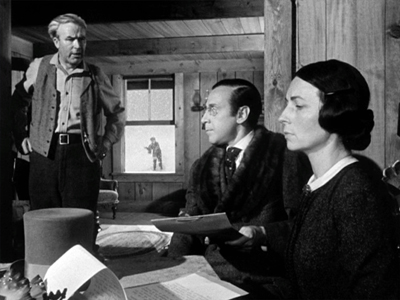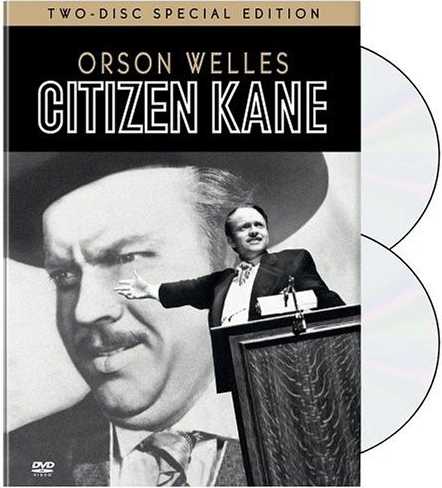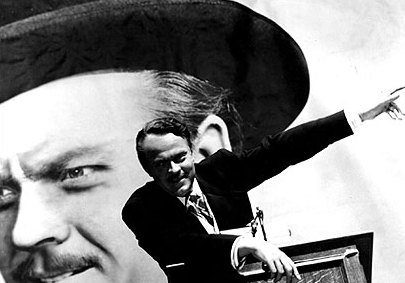Citizen Kane, by Orson Welles
DVD review of Citizen Kane, one of the great movies of the 20th Century, starring, produced and written by Orson Welles
Citizen Kane has been lauded as one of the the greatest films of the 20th Century, and justifiably so. Directed by and starring Orson Welles as the famous millionaire, Charles Foster Kane. Kane is a barely-disguised rendering of William Randolph Hearst. The film begins with his death, as he drops a snow globe and dies, uttering his final word, “Rosebud.” The movie proceeds with a journalist trying to unravel the mystery of the millionaire’s life, seeking to find out who, or what, Rosebud was. By interviewing the various friends, enemies and acquaintances of Kane’s.
Citizen Kane proceeds in flashback, telling the story of Kane, as seen from the perspective of friends, enemies, ex-wives and former employees. With the pieces of the puzzle slowly falling into place. By the end of the movie, the audience knows who Kane was, the tragedy of his life, and about ‘Rosebud’. Although none of the movie’s characters do. It’s a fine movie, well deserving of it’s reputation, and definitely worth watching.
Editorial Review of Citizen Kane courtesy of Amazon.com
Arguably the greatest of American films, Orson Welles’s 1941 masterpiece, made when he was only 26, still unfurls like a dream and carries the viewer along the mysterious currents of time and memory to reach a mature (if ambiguous) conclusion: people are the sum of their contradictions, and can’t be known easily. Welles plays newspaper magnate Charles Foster Kane, taken from his mother as a boy and made the ward of a rich industrialist. The result is that every well-meaning or tyrannical or self-destructive move he makes for the rest of his life appears in some way to be a reaction to that deeply wounding event.
Written by Welles and Herman J. Mankiewicz, and photographed by Gregg Toland, the film is the sum of Welles’s awesome ambitions as an artist in Hollywood. He pushes the limits of then-available technology to create a true magic show, a visual and aural feast that almost seems to be rising up from a viewer’s subconsciousness. As Kane, Welles even ushers in the influence of Bertolt Brecht on film acting. This is truly a one-of-a-kind work, and in many ways is still the most modern of modern films from the 20th century. —Tom Keogh
Citizen Kane DVD features

No minuscule “featurette” for the greatest movie ever made. The backbone for this grand two-disc set is the 1995 Oscar®-nominated documentary The Battle over Citizen Kane, a very rich two-hour film on how this masterpiece was almost destroyed by Welles’s adversary, William Randolph Hearst. A great remastered print is complemented by two running commentaries, the better one by critic Roger Ebert. Don’t think you want a two-hour lecture by Mr. Ebert? Just listen to his 10-minute talk over the gallery of photographs from the movie (which you can flip through manually with your remote or see as a slide show), and you’ll want more. Ad campaigns, storyboards, and even call sheets are included in this must-have DVD. —Doug Thomas
Famous quotes from Citizen Kane, starring Orson Welles
Charles Foster Kane (Orson Welles): Rosebud.
Female reporter: If you could’ve found out what Rosebud meant, I bet that would’ve explained everything.
Thompson: No, I don’t think so; no. Mr. Kane was a man who got everything he wanted and then lost it. Maybe Rosebud was something he couldn’t get, or something he lost. Anyway, it wouldn’t have explained anything… I don’t think any word can explain a man’s life. No, I guess Rosebud is just a… piece in a jigsaw puzzle… a missing piece.
Kane’s Father: A good whuppin’s all the kid really needs.
Mary Kane(Agnes Moorehead): That’s why I’m sending him where you can’t get at him.
Charles Foster Kane (Orson Welles): You know, Mr. Bernstein, if I hadn’t been very rich, I might have been a really great man.
Walter Parks Thatcher: Don’t you think you are?
Charles Foster Kane (Orson Welles): I think I did pretty well under the circumstances.
Walter Parks Thatcher: What would you like to have been?
Charles Foster Kane (Orson Welles): Everything you hate.
Charles Foster Kane (Orson Welles): Hello Jedediah.
Leland (Joseph Cotten): Hello, Charlie. I didn’t know we were speaking…
Charles Foster Kane (Orson Welles): Sure, we’re speaking, Jedediah: you’re fired.
Charles Foster Kane (Orson Welles): I always gagged on the silver spoon.
[Quoting from Kane’s letter]
Walter Parks Thatcher: I think it would be fun to run a newspaper.
[last lines]
Raymond: Throw that junk in.


